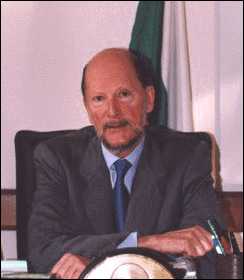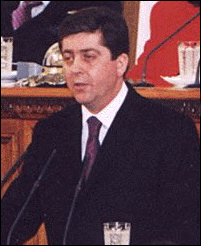 A MONARCH FOR PM, A SOCIALIST FOR PRESIDENT A MONARCH FOR PM, A SOCIALIST FOR PRESIDENT |

2001 marked a new turn in the country's modern history. Bulgaria's monarch Simeon II Saxe Coburg-Gotha, in exile since 1947 (when the monarchy in Bulgaria was abolished by a referendum), made a spectacular return to politics, winning a stunning and unexpected support for his multi-party National Movement Simeon II (NMS) at the general elections in June, promising a "new era" of "new political morals".
Soon after the elections Simeon Saxe Coburg-Gotha took the reins of the Executive Power, and without formally abdicating from his claim to the Bulgarian crown, stepped in as Prime Minister of the "youngest" ever (by the average age of its members) Bulgarian cabinet, formed by the NMS parliamentary majority with the support of the ethnic Turks' Movement for Rights and Freedoms.
 |
In a twist of irony several months later the Prime Minister urged his supporters to vote for the then President Peter Stoyanov, who was running as an "independent" candidate supported by the former ruling Union of Democratic Forces (UDF), currently the most outspoken opposition against the NMS. Stoyanov failed to gauge properly the public mood and lost to the leader of the Bulgarian Socialist Party (BSP) Georgi Parvanov.
The BSP had been swept from power in 1997 by the public discontent over hyper-inflation which drove living standards to their lowest since the beginning of economic reforms in Bulgaria in 1990. Bulgaria made the headlines worldwide during that period with the resolute unwillingness of its citizens to bear with an inefficient government. The then President Peter Stoyanov, and his successor today, Georgi Parvanov, are widely considered as having masterminded the compromises needed to avoid violence in an already explosive situation.
In 2001, Bulgarian voters ridiculed the learned forecasts of pollsters and political scientists and analysts, and Bulgaria again made the world headlines after it found itself in the unique situation of being governed by a monarch, sworn to defend republican principles with the support of a political party dominated by ethnic Turks (the Movement for Rights and Freedoms) and headed by a leftist president, who underscored the republican principles of government in his inauguration address.
Those who do not know the country largely perceive Bulgaria as a typical Balkan state. But in reality it is far from being typically Balkan, as in many aspects it is very different from any of its neighbours. It is ethnically diverse, yet it has never had any ethnic problems to emerge violently at the surface of political life after the changes in 1989, and it seems to be safe from grave ethnic problems in the future.
 |

